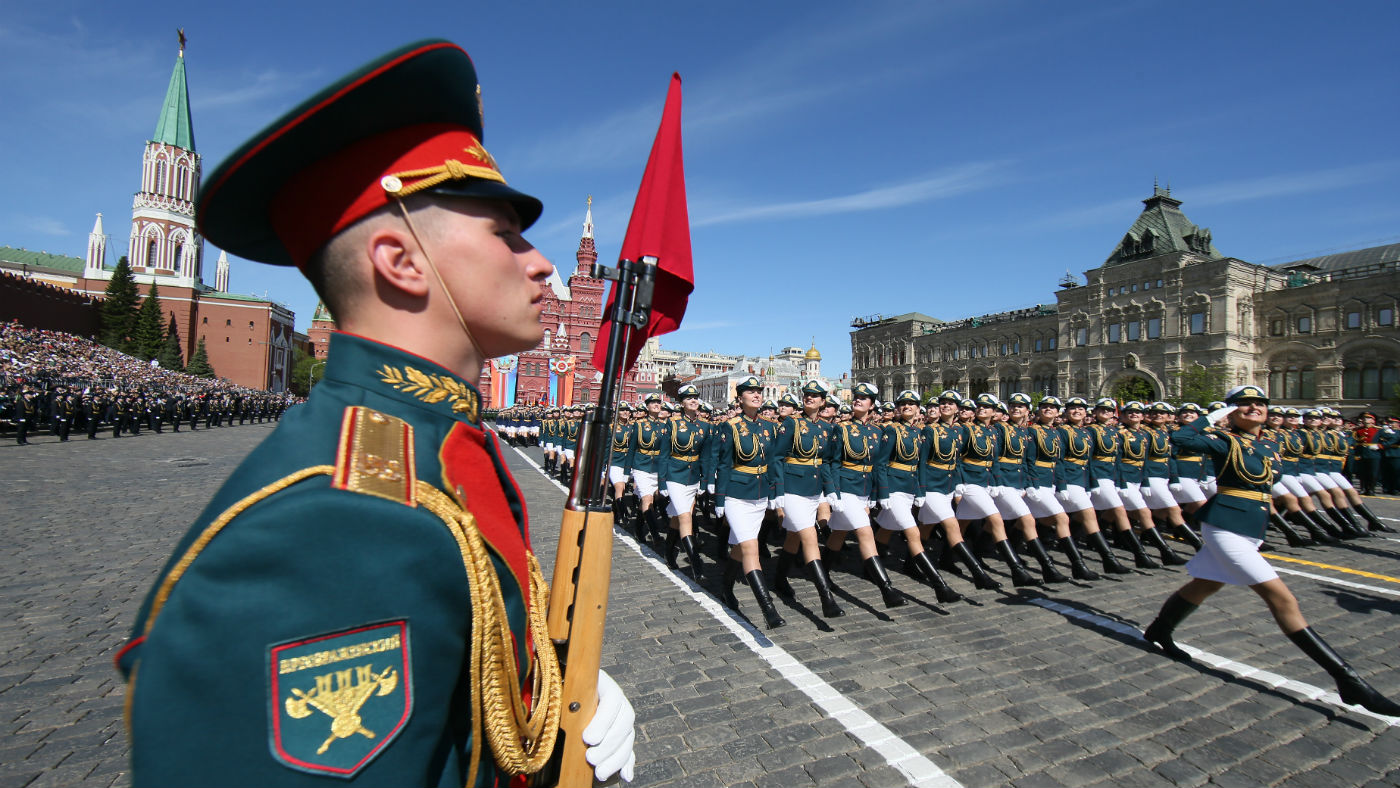Russia shows its teeth with Victory Day parade
Why this year’s Red Square event was worth watching

A free daily email with the biggest news stories of the day – and the best features from TheWeek.com
You are now subscribed
Your newsletter sign-up was successful
Fresh from his inauguration for a fourth term as president ,Vladimir Putin used this year’s Victory Day parade in Moscow to reaffirm Russia’s willingness to defend itself against Western aggression.
As well as thousands of troops and hundreds of tanks, the annual military parade through Red Square showcased some of Russia’s most advanced weaponry. This included nuclear missiles, a flypast by Russia’s new SU-57 stealth fighter, which has recently been deployed to Syria, and a new hypersonic missile, known as the Kinzhal, which Putin recently described as “invincible”.
The Victory Day parade, which commemorates the 27 million Russians who died defeating Nazi Germany in the Second World War, has become “a major public ritual in Russia”, says CNN.
The Week
Escape your echo chamber. Get the facts behind the news, plus analysis from multiple perspectives.

Sign up for The Week's Free Newsletters
From our morning news briefing to a weekly Good News Newsletter, get the best of The Week delivered directly to your inbox.
From our morning news briefing to a weekly Good News Newsletter, get the best of The Week delivered directly to your inbox.
Russia’s role in defeating Nazism has assumed even greater significance since the collapse of the Soviet Union and the loss of superpower status in the 1990s.
In recent years, says The Guardian, “critics have accused the Kremlin of using the holiday to push an aggressive form of nationalism”. Reuters says the authorities “use the event to boost patriotic feeling and show the world and potential buyers of military hardware how a multi-billion dollar modernisation programme is changing the face of the Russian military”.
Since coming to power, Putin has increased military spending significantly, handed the military significant policy-making clout, and deployed Russian forces in Ukraine and Syria.
While Putin has stated he does not want a new arms race, with relations with the West at their worst levels since the Cold War, he used this year’s Victory Day parade to warn potential enemies that Russia has the capabilities and the will to defend itself from attack.
A free daily email with the biggest news stories of the day – and the best features from TheWeek.com
“Peace is very fragile,” Putin said in a speech marking the start of the parade. “We remember the tragedies of the two world wars, about the lessons of history which do not allow us to become blind. The same old ugly traits are appearing along with new threats: egoism, intolerance, aggressive nationalism and claims to exceptionalism.”
“We understand the full seriousness of those threats,” he added.
In a reminder of the complex geopolitics of Russia’s position, Putin was joined by Israeli Prime Minister Benjamin Netanyahu, who is in Moscow for talks on Syria. While Russia is a staunch ally of Israel’s sworn enemy, Iran, Netanyahu’s visit is a tacit acknowledgment of Putin’s role as the Middle East’s primary power broker.
-
 Political cartoons for February 16
Political cartoons for February 16Cartoons Monday’s political cartoons include President's Day, a valentine from the Epstein files, and more
-
 Regent Hong Kong: a tranquil haven with a prime waterfront spot
Regent Hong Kong: a tranquil haven with a prime waterfront spotThe Week Recommends The trendy hotel recently underwent an extensive two-year revamp
-
 The problem with diagnosing profound autism
The problem with diagnosing profound autismThe Explainer Experts are reconsidering the idea of autism as a spectrum, which could impact diagnoses and policy making for the condition
-
 The fall of the generals: China’s military purge
The fall of the generals: China’s military purgeIn the Spotlight Xi Jinping’s extraordinary removal of senior general proves that no-one is safe from anti-corruption drive that has investigated millions
-
 What happens now that the US-Russia nuclear treaty is expiring?
What happens now that the US-Russia nuclear treaty is expiring?TODAY’S BIG QUESTION Weapons experts worry that the end of the New START treaty marks the beginning of a 21st-century atomic arms race
-
 Epstein files topple law CEO, roil UK government
Epstein files topple law CEO, roil UK governmentSpeed Read Peter Mandelson, Britain’s former ambassador to the US, is caught up in the scandal
-
 Iran and US prepare to meet after skirmishes
Iran and US prepare to meet after skirmishesSpeed Read The incident comes amid heightened tensions in the Middle East
-
 Syria’s Kurds: abandoned by their US ally
Syria’s Kurds: abandoned by their US allyTalking Point Ahmed al-Sharaa’s lightning offensive against Syrian Kurdistan belies his promise to respect the country’s ethnic minorities
-
 Israel retrieves final hostage’s body from Gaza
Israel retrieves final hostage’s body from GazaSpeed Read The 24-year-old police officer was killed during the initial Hamas attack
-
 China’s Xi targets top general in growing purge
China’s Xi targets top general in growing purgeSpeed Read Zhang Youxia is being investigated over ‘grave violations’ of the law
-
 Ukraine, US and Russia: do rare trilateral talks mean peace is possible?
Ukraine, US and Russia: do rare trilateral talks mean peace is possible?Rush to meet signals potential agreement but scepticism of Russian motives remain